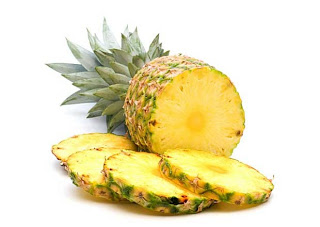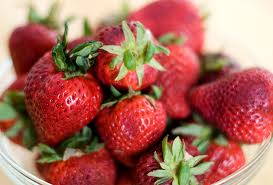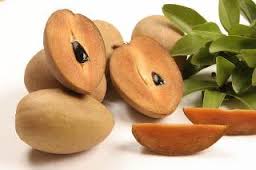|
Untitled Document
|
| |
Healthy Eating Guides |
| |
|
| |
Diet Vitamins |
| |
|
| |
|
|
|
|
|
|
|
|
| Vitamin B5 (Pantothenic Acid) |
|
|
|
|
|
| |
|
| |
|
| |
|
| |
 |
Pineapple |
| Pineapple fruit contains a proteolytic enzyme bromelain that digests food by breaking down protein. Bromelain also has anti-inflammatory, anti-clotting and anti-cancer properties. Studies have shown that consumption of pineapple regularly helps fight against arthritis, indigestion and worm infestation. Fresh pineapple is an excellent source of antioxidant vitamin; vitamin C. 100 g fruit contains 47.8 or 80% of this vitamin. Vitamin C is required for the collagen synthesis in the body. Collagen is the main structural protein in the body required for maintaining the integrity of blood vessels, skin, organs, and bones. Regular consumption of foods rich in vitamin C helps the body protect from scurvy; develop resistance against infectious agents (boosts immunity) and scavenge harmful, pro-inflammatory free radicals from the body. It also contains small amount Vitamin A (provides 58 IU per 100 g) and beta-carotene levels. These compounds are known to have antioxidant properties. Vitamin A is also required maintaining healthy mucus membranes, skin and essential for vision. Studies have suggested that consumption of natural fruits rich in flavonoids helps the human body to protect from lung and oral cavity cancers. In addition, this fruit is rich in B-complex group of vitamins like folates, thiamin, pyridoxine, riboflavin and minerals like copper, manganese and potassium. Potassium is an important component of cell and body fluids, helps controlling heart rate and blood pressure. Copper is a helpful cofactor for red blood cell synthesis. Manganese is a co-factor for the enzyme superoxide dismutase, which is a very powerful free radical scavenger. |
|
| |
|
| |
|
| |
|
| |
 |
Strawberries |
| The fruit is rich in B-complex group of vitamins. It contains very good amounts of vitamin B-6, niacin, riboflavin, pantothenic acid and folic acid. These vitamins are acting as co-factors help the body metabolize carbohydrate, proteins and fats. Strawberries contain vitamin A, vitamin E and health promoting flavonoid poly phenolic antioxidants such as lutein, zea-xanthin, and beta-carotene in small amounts. These compounds help act as protective scavengers against oxygen-derived free radicals and reactive oxygen species (ROS) that play a role in aging and various disease processes. Furthermore, They contain a good amount of minerals like potassium, manganese, fluorine, copper, iron and iodine. Potassium is an important component of cell and body fluids that helps controlling heart rate and blood pressure. Manganese is used by the body as a co-factor for the antioxidant enzyme, superoxide dismutase. Copper is required in the production of red blood cells. Iron is required for red blood cell formation. Fluoride is a component of bones and teeth and is important for prevention of dental caries. |
|
| |
|
| |
|
| |
|
| |
 |
Sapodilla (Sapote) |
| Sapodilla is rich calories, 100 g provides 83 calories. In addition, it is a very good source of dietary fiber (5.6 g/100g), which makes it an excellent bulk laxative. The fiber content helps relieve constipation episodes and help protect the mucous membrane of the colon from cancer-causing toxins by firmly binding to them. Sapote contains a good amount of antioxidant vitamins like vitamin C (24.5% of recommended daily intake per 100 g of fruit) and vitamin A. Vitamin A is essential for vision. It is also required for maintaining healthy mucus membranes and skin. Consumption of natural fruits rich in vitamin A has been known to protect from lung and oral cavity cancers. So also, consumption of foods containing in vitamin C helps the body develop resistance against infectious agents and scavenge harmful free radicals. Fresh ripen sapodilla is a good source of minerals like potassium, copper, iron and vitamins like folate, niacin and pantothenic acid. These compounds are essential for optimal health as they involve in various metabolic processes in the body as cofactors for the enzymes. |
|
| |
|
|